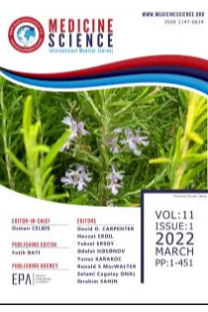Communication difficulties in perioperative anesthesia management for immigrant and refugee patients
___
Devi S. Syria’s health crisis: 5 years on. Lancet. 2016;387:1042-3.2016 migration report of Turkey. http://www.goc.gov.tr/files/files/2016_yiik_ goc_raporu_haziran.pdf
Patient rights regulation. http://www.mevzuat.gov.tr/Metin. Aspx?MevzuatKod=7.5.4847&sourceXmlSearch=&MevzuatIliski=0 access date 01.08.1998.
Law on foreigners and international protection. http://www.resmigazete.gov. tr/eskiler/2013/04/20130411-2.htm access date 01.11.2018
2017 Migration statistical report of Turkey. https://www.kizilay.org.tr/Upload/ Dokuman/Dosya/38492657_2017-yili-goc-istatistik-raporu-ocak-2018.pdf access date 03.11.2018
Field survey on demographic view, living conditions and future expectations of Syrians of Turkey. https://www.afad.gov.tr/upload/Node/25335/ xfiles/17b-Field_Survey_on_Demographic_View_Living_Conditions_and_ Future_Expectations_of_Syrians_in_Turkey_2017_English_1.pdf access date 05.11.2018
Priebe S, Sandhu S, Dias S et al. Good practice in health care for migrants: views and experiences of care professionals in 16 European countries. BMC Public Health. 2011;11:1-12.
Dowsey MM, Broadhead ML, Stoney JD et al. Outcomes of total knee arthroplasty in English versus non–English-speaking patients. J Orthop Surg. 2009;17:305-9.
Akkoç S, Tok M, Hasiripi A. The problems encountered by healthcare workers while offering an medical care to refugees and asylum seekers. Health Care Acad J. 2017;4:23-7.
Ruppen W, Urwyler A, Bandschapp O. Language difficulties in outpatients and their impact on a chronic pain unit in Northwest Switzerland. Swiss Med Wkly. 2010;140:260-4.
Morris MD, Popper ST, Rodwell TC et al. healthcare barriers of refugees post-resettlement. J Community Health. 2009;34:529-38.
Ring DC, Herndon JH, Meyer GS. Case 34-2010 – a 65-year-old woman with an incorrect operation on the left hand. N Engl J Med 2010;363:1950-7.
Barash PG, Cullen BF, Stoelting RK. In: Clinical Anesthesia. 5th edition. Lippincott Williams and Wilkins Press, Philadelphia 2006, 257.
Shapeton A, O’Donoghue M, Vielen BV, Barnett SR. Anesthesia lost in translation: perspective and comprehension. JEPM. 2017;19:1-8.
Improving patient safety systems for patients with limited English proficiency: A guide for hospitals. https://www.ahrq.gov/sites/default/files/publications/ f iles/lepguide.pdf access date 01.11.2018
Asked questions on informed consent for procedures. American Society of Anesthesiologists Committee on ethics. http://www.asahq.org/~/media/sites/ asahq/files/public/resources/faq-anesthesia-consent-ver-1-5.pdf access date 23.11.2016
Jones JW, Mccullough LB, Richman BW. Informed Consent: It’s Not Just Signing a Form. Thoracic Surg Clin. 2005;15:451-60.
Soysal A, Yağar F. Assessment of the effectiveness of healthcare management about Syrian asylum seekers in Turkey. 2nd Middle East Conferences: Migration Issues in the Context of Conflict in the Middle East, 28-29 April, 2016. Kilis, Turkey, 441-52.
Flores G. The impact of medical interpreter services on the quality of health care: a systematic review. Med Care Res Rev. 2005;62:255-99.
Palinkas, LA, Pickwell SM. Acculturation as a risk factor for chronic disease among Cambodian refugees in the United States. Social Science & Medicine, 1995;40:1643-53.
Griswold K, Zayas LE, Kernan JB, Wagner CM. Cultural awareness through medical student and refugee patient encounters. J Immigrant Minority Health, 2007:9:55-60.
Pottie K, Greenaway C, Feightner J et al. Evidence-based clinical guidelines for immigrants and refugees. CMAJ. 2011;183:824-925.
- ISSN: 2147-0634
- Yayın Aralığı: 4
- Başlangıç: 2012
- Yayıncı: Effect Publishing Agency ( EPA )
Malaria prevalence and risk analysis among pregnant women in Bungoma county, Kenya
Wekesa Antony WANYONYİ, Chrispinus Siteti MULAMBALAH, David H. MULAMA, Elizabeth OMUKUNDA
An updated overview of periodontal health in chronic diseases
The history and current status of forensic pathology
Mumine GORMEZ, Emine TÜRKMEN ŞAMDANCI
Pemphigus vulgaris and koebner phenomenon
Hulya NAZİK, Perihan OZTURK, Mehmet Kamil MULAYİM, Esra ASLAN KOYUNCU
The effects of thyroid hormones levels on prognosis after pediatric heart surgery
Engin GURCU, Ahmet YÜKSEL, Yusuf VELİOĞLU, Isik Senkaya SİGNAK
Cause of rare acute abdomen: Primary omental torsion
Gulseren AKPİNAR, Bedia GULEN, ALİ DUMAN, Afsin IPEKCI, Hilal HOCAGİL
Effects of L-Carnitine and N-Acetylcysteine on nonalcoholic hepatic steatosis in rats
Cemal NAS, Mehmet Tahir GÖKDEMİR, Naime CANORUC, Mehmet YALDİZ
Ultrasound-guided supracondylar radial nerve block in pain management of distal radius fractures
Nutritional status of elderly people living in nursing home and some related factors
Recep BENTLİ, Neşe KARAKAŞ, Betul FİRİNCİ, Serdar DENİZ
Deniz AVCİ, Ali CETİNKAYA, Yetka GULUNAY, Sadik OLUK, Abdullah EYVAZ
